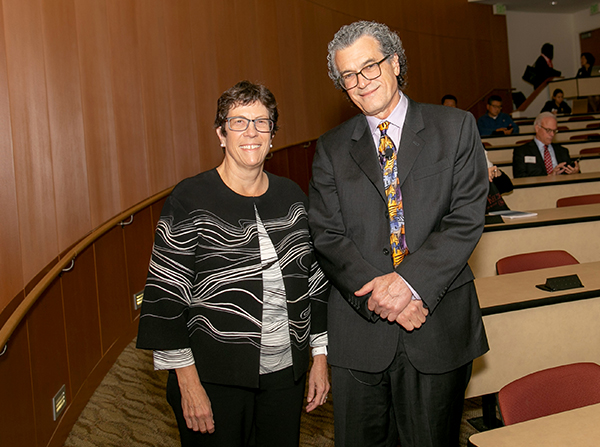Keck School of Medicine of USC Dean Laura Mosqueda, MD, welcomed Eliseo J. Pérez-Stable, MD, as guest speaker for the 2018 Dean’s Distinguished Lecturer Series. Pérez-Stable, director of the National Institute on Minority Health and Health Disparities (NIMHD), delivered an eye-opening lecture entitled, “The Science of Minority Health and Health Disparities: NIMHD Perspective.” The talk was presented Dec. 4 on the Health Sciences Campus.

Eliseo J. Pérez-Stable, right, and Laura Mosqueda are seen before Pérez-Stable spoke at the Dean’s Distinguished Lecturer event, held Dec. 4 on the Health Sciences Campus. (Photo/Ricardo Carrasco III)
“The intersection of health care and social justice is important to me and, I think, to all of us,” Mosqueda noted during her impassioned introduction, adding that USC’s location and culture offer a particularly unique point of view on racial and social disparities not afforded to most health care providers across the country. “How do we meaningfully engage our community and our research programs to ensure we’re asking the right questions?”
Pérez-Stable’s sobering but hopeful speech outlined how deeply minorities have been let down by the health care community over the years, and explained how the health statistics and issues for many minority groups have been under-investigated at best and systematically dismissed at worst.

Eliseo J. Pérez-Stable gives a talk about minority health disparities during the Dean’s Distinguished Lecturer event. (Photo/Ricardo Carrasco III)
“We endorse the idea that all race ethnic minority groups share the social disadvantage that is based on being subject to discrimination,” Pérez-Stable said. “I think this is a great time to embark on an investigation of these areas.”
To illustrate, Pérez-Stable discussed basic problems with the U.S. Census’ six basic racial classifications, noting that the “whites” category included Middle Eastern and some North African people. He added, however, that the 2020 census would finally allow African-Americans and white people to state their country of origin or background.
“That’s the first time we’ll have that kind of granularity of information to work with,” Pérez-Stable noted with some relief. Census data helps determine statistics of life expectancy for different groups, and more detail means more specific science, he explained.
Among a wealth of other possible solutions to such deeply ingrained imbalances, Pérez-Stable suggested that one possible way to combat racial disparities in health care in the long run was to train more minority physicians. “I think you’ll get a lot of mileage out of that,” he added.
— Yancy Jack Berns